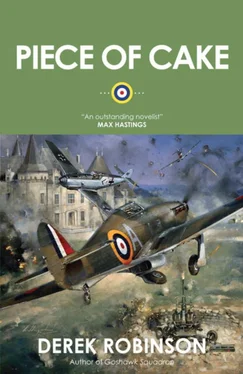CH3 stood up. “You’d better hurry,” he said. “Hitler might get here first and spoil your story.”
She shook her head. “Hitler won’t invade.”
“You have inside information on that too?”
“In a way,” she said, “I guess I have.”
Baggy Bletchley stood in the middle of the ops room at Brambledown and looked at the fluffy clouds drifting overhead. A near-miss by a five-hundred-kilogram high-explosive bomb had folded two walls flat and the roof had collapsed. Mobile cranes had been brought in to lift the jagged slabs of concrete and men had worked through the night, shoveling rubble. The bodies of four Waafs and two airmen had been removed, the blood washed off the plotting table, most of the lines reconnected. Everything was makeshift but at least the ops room was working. “Bloody good show,” he said.
“Why they didn’t put these places underground beats me,” the sector controller grumbled.
“Presumably they thought they were safe enough above ground.”
“Then why put the Group ops room underground? And Command ops?”
“God knows.” Bletchley had been up all night, driving from one sector station to another: Biggin Hill, Kenley, Hornchurch, North Weald: checking the damage, counting the casualties, applying every pressure to get the stations fully operational again by daybreak. He had not always been welcome. Morale in some places was less than good. The strain of repeated bombings and strafings was beginning to tell. “There are lots of things they should have done. They should have trained another thousand fighter pilots immediately after Dunkirk, but they didn’t, and now we’re sending up spotty youths and lunatics left over from Bomber Command. But that’s the way it is, so…” He squinted at the blackboard leaning against the broken remains of the tote. “What does that say about Hornet squadron?”
“Airborne ten minutes ago. We’ve handed them over to Kenley Sector. They’ve got raid 430 if it doesn’t turn back.”
Bletchley found the plaque reading H430 on the table. Fifty plus at angels eighteen. The arrows below it drove deep into the heart of Kent. “Good luck,” he grunted.
The sector controller had just been handed a teleprinter message. “Charming,” he said. “Group have changed the angels code again. Evidently Luftwaffe intelligence has cottoned onto our little subterfuge, so from now on we understate height by four thousand, not two. Angels eight now means twelve thousand.”
“That should keep the Hun guessing for a while.”
“Yes.” He blew against the edge of the paper and made a soft whistle. “There’s only one problem. The land lines are still down at Bodkin Hazel. This signal won’t have got through.”
“Well…” Bletchley had been inventing stop-gap solutions all night. “Get on the R/T and tell Barton… No. Not a good idea. Sorry. The brain’s slowing down. Dispatch-rider?”
“He’d take an hour to get there. By that time they might have been scrambled again.” He re-read the signal. “Never mind, I can’t think of anything better so a dispatch-rider it’ll have to be.” He reached for the telephone.
“Wait a minute,” Bletchley said. “I’ll go. I can nip down there in ten minutes in the Tiger Moth. Leave it to me.”
Everything was quiet at Bodkin Hazel when he landed. GPO vans clustered around the control tower. A small steamroller chuntered up and down the middle of the field, flattening the refilled craters. Groundcrews sat or lay in the shade of the reserve Hurricanes and waited for the squadron to return. Away in the distance, beyond the perimeter wire, a small black car shimmered in the baking heat.
Baggy Bletchley strolled around the three plywood mock-ups, slightly pockmarked by rifle-fire, and wondered what they were for. He turned away and walked toward the tower. After a few yards his digestive system began demanding action. It was accustomed to a regular schedule of bowel movements. That schedule had been disrupted by the constant travel and activity of the past twenty-four hours but enough was enough. Nature called, insistently. He changed direction.
The portable lavatory had been cleaned out since Steele-Stebbing took Cattermole for a ride. It smelled powerfully of pine disinfectant and it was hot. There was no ventilation and the door refused to stay open. Baggy Bletchley was soon sweating and his buttocks stuck to the toilet seat.
His nickname was well-earned. When he was a young lieutenant, Bletchley’s testicles hung unusually low; now, with the weight of years, they had dropped even further.
He took a handful of toilet paper and gently raised himself. The seat—stuck to his buttocks—rose with him. Slightly disconcerted, he sat down; but as he did so his testicles swung forward and slipped between the inside of the seat and the outside of the bucket, and he sat on them, which was very painful. His natural reaction was to stand, but now the seat had come unstuck and his testicles were trapped in the gap between seat and bucket. This gap was too narrow to let them be pulled out, and so the more he stood the more they hurt. The pain of standing made him sit; the agony of sitting forced him to stand.
At first he laughed through his tears. What worried him most was the possible embarrassment of being found in this ludicrous situation, squatting, caught by the balls in a mobile bog. After a couple of minutes it wasn’t funny: His thighs ached. His stomach muscles were about to give way. He pounded on the wall and shouted. Nobody came. In his sweating, suffering obsession with his dilemma he had failed to hear the air-raid warning.
The ack-ack opened up with a clamor like a hundred drunken blacksmiths. The racket made Bletchley all the more desperate to escape. He managed to get one hand onto the rim of the bucket and he transferred much of his weight to it. The raiders were Me-110’s, charging in from the sea at fifty feet, too low for most of the guns. They made one sweep, one raging, strafing, blinding, swamping attack, and then they were gone. Six 110’s totaled twelve machine-guns, firing armor-piercing and incendiary rounds, and twelve cannon, firing explosive shells. The reserve Hurricanes collapsed, ripped apart. Skull’s plywood mock-ups flew apart. The crew-room was wrecked, a petrol bowser exploded, and the portable lavatory was bowled over, rolling like a log as it got kicked by repeated bursts of fire.
The squadron landed twenty minutes later. The groundcrews were running alongside the planes as they taxied to a halt. Armorers scrambled onto the wings with belts of ammunition slung around their necks while fitters and riggers leaned into the cockpits to ask about damage. Fresh oxygen bottles were installed. The pilots stayed in their seats. Within fifteen minutes the petrol bowsers were backing away and a last polish was being given to the windscreens. The engines, still hot, fired at once. A white flare climbed from the tower. The squadron took off.
The controller was crisp and clear. “Hello, Popcorn Leader, this is Teacake. Vector one-zero-zero, make angels eight.”
Barton acknowledged. Eight and two was ten, which sounded a bit low, so he stuck on five hundred for luck. The raid came in at twelve thousand, a great mob of Heinkels with a swarm of 109’s all around. Hornet squadron was still clawing for height, which suited the escort perfectly. Half of them came down like the wrath of God.
Renouf lost his prop almost immediately and baled out, landing safely. Mother Cox took a burst in the right aileron and fluttered down like a broken butterfly before he too baled out. CH3 and Barton limped home and had to make belly-landings. Flash Gordon’s undercarriage collapsed on touchdown and the plane pirouetted on a wingtip. He whacked his head against the gunsight and was carried away with a mask of blood hiding his face.
Читать дальше












